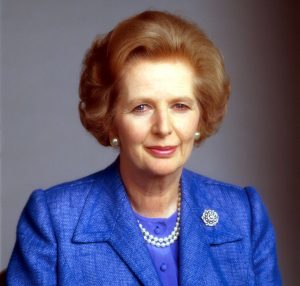One of the most well known and controversial female politicians is Margaret Thatcher. She made history in 1978 when she was elected the first female Prime Minister of Great Britain. She went on to serve three terms as Prime Minister and during this time the policies she implemented earned her the nickname “The Iron Lady”.
She was introduced to politics by her father, a member of the Conservative party. She studied chemistry at Oxford, where she was the president of the Conservative Association at the university. She went on to work as a research chemist. In the early 1950s she made a couple of unsuccessful attempts to enter politics. She went back to university to study law and worked for a time as a barrister. She went on to win a seat in the House of Commons in 1959.
She had a rapid rise in politics: in 1961 she was chosen as the undersecretary for pensions and national insurance. Once the Labour Party took control she became a member of the Shadow Cabinet. It wasn’t until 1970 that the Conservative Party came back into office, at this time she was named Secretary of State for Education and Science. During her time in this position she received a lot of bad press due to the policies she implemented. She faced the most criticism when she ended the free milk in school scheme. It was also during this time that she famously said that there would never be a female prime Minister in her lifetime. She had become quite frustrated by the fact that a number of her ideas were being ignored by the Prime Minister at the time.
The Conservative Party lost the general election in 1974 and the following year she became the leader of the party. This was the first time a woman was leader of the opposition in Westminster. She made even more history at the end of the decade when she was elected the first female Prime Minister of Great Britain in 1979. She came into power at a very tumultuous time in Britain’s history. The country was deep in a recession and so she chose to raise interest rates. During her time in power she also reduced spending on education and housing. Despite these unpopular decisions the economy did improve. She oversaw the privatisation of public transport and of social housing. Many people have compared her to Ronald Reagan who used similar economic policies the United States; the two were in fact quite good friends.
It was during her third term she introduced perhaps her least popular tax, the Community Charge (it was also known as the poll tax). This was a fixed rate local tax that everyone was forced to pay. This would be the turning point for her career as there were many protests all over the country and she faced opposition from within her own party. She resigned in November of 1990. She entered the House of Lords in 1992 and wrote a number of books about her time in politics. She died in 2013 at the age of 87.
Since her death her career has been discussed by supporters and opponents alike. Despite being such a controversial figure the fact that she shattered the glass ceiling in British politics cannot be argued, and for this reason she will always be a political powerhouse.
-Michelle O’Brien
Junior Girl
Girl Museum Inc.

